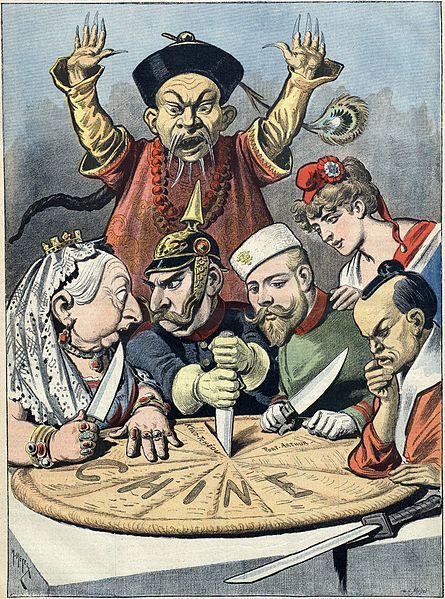asianhistory: A shocked mandarin in Manchu robe in the back, with Queen V
asianhistory: A shocked mandarin in Manchu robe in the back, with Queen Victoria (UK),William II (Germany), Nicholas II (Russia), Marianne (France), and a samurai (Japan) cutting up a king cake with Chine (“China” in French) written on it. French Political Cartoon on Imperialism. The phrase “sick man of Asia” or “sick man of East Asia” originally referred to China in the late 19th and early 20th centuries when it was riven by internal divisions and forced by the great powers into a series ofUnequal Treaties, culminating in the Japanese invasion of China during World War II. The phrase was intended as a parallel to “sick man of Europe”, referring to the weakening Ottoman Empire during the same period. Early in the 19th century, serious internal weaknesses developed in the Qing dynasty, greatly exacerbated and taken advantage of by Western powers. These intentionally opened China up to Western, Japanese, and Russian imperialism. In 1839, upon a flimsy British pretense, China found itself fighting the First Opium War with Britain. China was defeated, and in 1842, agreed to the humiliating provisions of the Treaty of Nanjing. Hong Kong Island was ceded to Britain, and certain ports, including Shanghai and Guangzhou, were opened to British trade and residence. Britain’s demands included most-favored nation status. In 1856, the Second Opium War broke out. The Chinese were again defeated, and now forced to the terms of the 1858 Treaty of Tientsin. The treaty opened new ports to trade and allowed foreigners to travel in the interior. Christians gained the right to propagate their religion—another means of Western penetration. The United States and Russia later obtained the same prerogatives in separate treaties. Toward the end of the 19th century, China appeared on the way to territorial dismemberment and economic vassalage—the fate of India’s rulers that played out much earlier. Several provisions of these treaties caused long-standing bitterness and humiliation among the Chinese: extraterritoriality (meaning that in a dispute with a Chinese person, a Westerner had the right to be tried in a court under the laws of his own country), customs regulation, and the right to station foreign warships in Chinese waters. — Wikipedia -- source link
Tumblr Blog : asianhistory.tumblr.com
